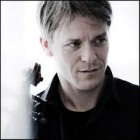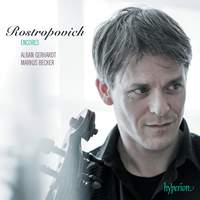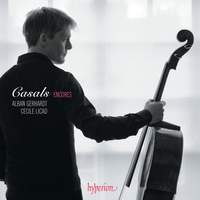Interview,
Alban Gerhardt on Rostropovich
 2017 sees the 90th anniversary of the birth of the legendary Russian cellist Mstislav Rostropovich (and also the 10th anniversary of his death). Both Deutsche Grammophon and Warner Classics will be paying tribute with extensive boxed sets of his recordings, but first up is Alban Gerhardt, who's marking the occasion with a collection of 'Slava''s encores (out last Friday on Hyperion).
2017 sees the 90th anniversary of the birth of the legendary Russian cellist Mstislav Rostropovich (and also the 10th anniversary of his death). Both Deutsche Grammophon and Warner Classics will be paying tribute with extensive boxed sets of his recordings, but first up is Alban Gerhardt, who's marking the occasion with a collection of 'Slava''s encores (out last Friday on Hyperion).
I spoke to Alban in December about his own personal relationship with Rostropovich and his legacy, and what these miniatures (a mixture of the cellist's own compositions, arrangements, and works dedicated to or inspired by him) reveal about one of the great musical personalities of the twentieth century.
Tell us a little about your own early encounters with ‘Slava’ – on disc, in live performance and face to face…
After knowing my first idol Pablo Casals only from recordings I was fortunate enough to hear Rostropovich more or less every other year with the Berlin Philharmonic, performing among others the concerti by Dvorak, Prokofiev, Penderecki and Lutoslawski as well as the Rococo Variations and Don Quixote. His incredible musical will and imagination inspired and influenced me deeply, and after playing for him as a 11-year-old I knew I wanted to become a cellist. In this 'lesson' he made quite clear that I had no business to be playing the far too difficult first movement of the Haydn C Major [concerto], but this constructive criticism prepared me for a much needed fresh start: my second teacher started me from scratch when I was 12 years old, only open strings and basic finger exercises. I met 'Slava' only two more times, in 1993 for a masterclass and a couple of years later in New York after he had conducted the NY Philharmonic, but I didn’t get to say more than 'bravo' after the performance. The masterclass though didn’t fulfill quite the high hopes I had as a 24-year old from my beloved idol, as I felt he was teaching more for the audience than for making me improve. I remember him asking me to play more like a singer after which he sat down and started playing some opera arias (Aida, Tosca) at the piano. Since my mother was a singer I knew all these arias backwards and was quietly pleased to take him by surprise by being able to actually play them as requested.
Do you use Rostropovich’s encores frequently in your own recitals, and more generally what do you feel is the function of an encore in itself: do you tend to see them as a postscript to the main programme, or as more of a palate-cleanser?
I definitely see an encore as a palate-cleanser, and especially after 'serious' repertoire like Beethoven or Brahms Sonatas it is nice to play something with a little wink, with a little fun, and the Rostropovich Encores are full of it, so yes, I do like to play them after recitals, although I am too lazy to prepare for each recital all of them… :)
Encores seem to hold a special fascination for you, given that you’ve previously released a disc of Casals’ encores – do you feel they give special insights into musical personalities, and how does the repertoire on the two discs compare?
In my teenage years I absolutely adored encores, listened to the encores of great virtuoso pianists (Horovitz, Rachmaninov), violinists (Heifetz, Oistrakh, Milstein etc.) and obviously my cello heroes Casals, Rostropovich, Feuermann and Piatigorsky. There is even a third encore disc, my so-called 'EMI debut' from 1998 with delightful Spanish encores mainly by Cassado and Albeniz. I do believe the way I interpret encores shows a lot about my personality as I treat them in an almost prudish way (compared to encores discs by more extrovert performers than myself) with maybe more respect than necessary, I don’t know. For me an encore is less a bonbon but much rather a jewel - it's almost more difficult to capture the spirit of it than a normal sonata, as the musical message is so condensed that it poses quite a challenge to to bring it to the point. How do the discs compare? Well, on the Rostropovich disc you can’t deny the Russian heritage of that great cellist: I am using a lot of his own transcriptions of great music by Prokofiev and Stravinsky, and we have Rachmaninov and Scriabin - pretty exotic encores which Casals wasn’t really interested in (or didn’t know). The Casals Encore disc is a bit more conventional, except maybe his Song of the Birds at the end, which is a signature encore, written by him. Both discs finish with a solo piece written by the great legend, and it definitely shows the difference of both performers.
There are three main types of work here – compositions by Rostropovich himself, bespoke arrangements which other composers made for him, and arrangements of his own…Do you see any common features throughout?
Absolutely - Rostropovich knew how to play the cello, how to make the cello sound at its best, and even the arrangements of other composers carry Slava’s signature. In his own two pieces we can actually hear the influence of Prokofiev (in the solo piece) and Popper’s Elfentanz.
Given that Rostropovich played a lot of his encores from memory, were there any issues getting hold of scores?
Yes, it wasn’t easy to get a hold of the scores as lots of it isn’t printed. Luckily I got the Prokofiev Cinderella-Waltz and March from the widow of my teacher [Boris] Pergamenschikow (it is out of print); otherwise I just bought violin arrangements and realized that Rostropovich must have used them with tiny little changes, if at all.
Finally, do you have plans to pay tribute to any other cello giants in the same way?
Before I recorded the Casals disc I layed out all the encores played by Casals, Rostropovich, Feuermann and Piatigorsky and distributed them evenly as obviously all of them shared some of the most famous encores, but each of them has his own 'signature' encores, so at the end it will be a compromise of most important encores which all of them played, mixed up with their special ones.
Alban Gerhardt's Rostropovich Encores was released on Hyperion on 30th December.
Available Formats: CD, MP3, FLAC, Hi-Res FLAC
'Gerhardt has a honeyed, liquid tone all his own. He has created a well-contrasted programme that clearly took a long time to research and hone...This is cello playing of exquisite sophistication and bold imagination. Casals, I feel sure, would have approved.' (BBC Music Magazine).
Available Formats: CD, MP3, FLAC




